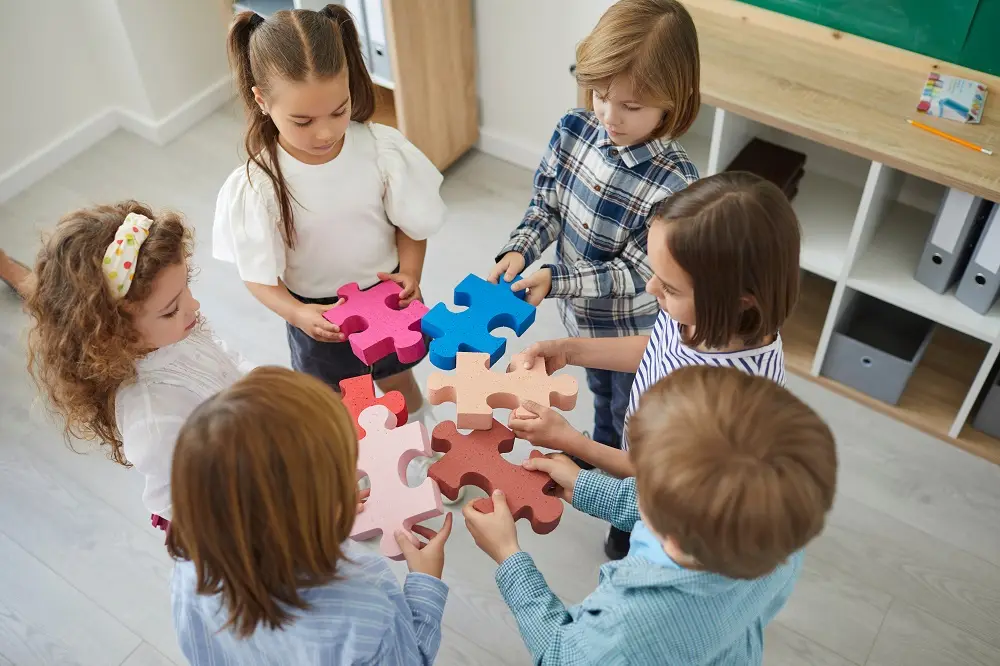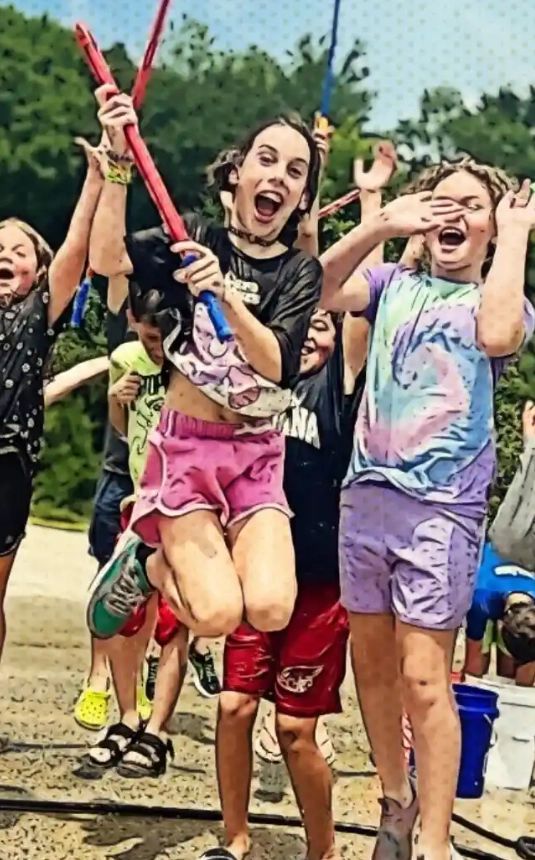Team building activities are not just for adults. In fact, they can be even more beneficial for kindergartners who are still in the early stages of social and emotional development. Engaging in fun and interactive team building activities can help young children build important skills such as cooperation, communication, problem-solving, and empathy.
In this article, we will explore the importance of team building in kindergarten and provide some creative and outdoor activities that can be done both in the classroom and outdoors. We will also discuss how to evaluate the effectiveness of these activities and make adjustments for continued growth and development.
The Importance of Team Building in Kindergarten
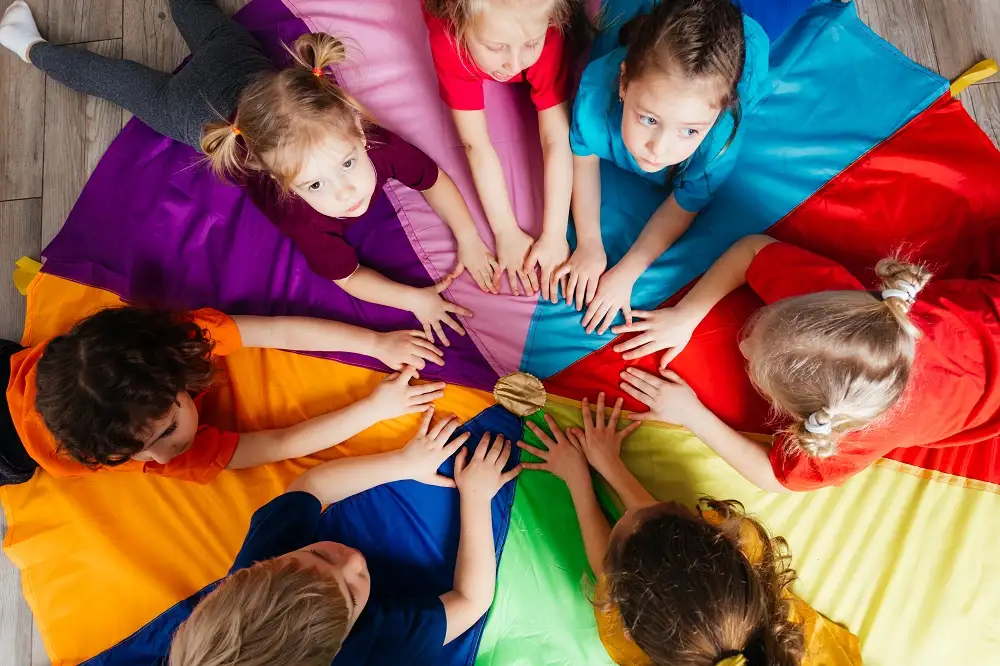
Team building activities in kindergarten are not just about having fun. They serve a crucial purpose in enhancing the social and emotional skills of young children. By engaging in activities that promote teamwork, kindergartners learn valuable lessons that will benefit them in their academic and personal lives.
Here’s how kindergarten students benefit from team activities:
- Enhanced social skills: By working together with their peers towards a common goal, children develop important skills, including taking turns, sharing, listening to others’ ideas, and respecting different perspectives.
- Promoted cooperation and collaboration: Young learners realize the importance of working together as a team and understand that success often comes from the collective effort of the group.
- Enhanced problem-solving skills: When kids learn to tackle challenges together, they develop creative thinking abilities and discover new skills that help them approach problems from different angles.
- Boosted confidence and self-esteem: Encouraging children to succeed together helps them feel supported, accomplished, and proud of their team contributions.
Team building in kindergarten is the foundation for lifelong social and emotional growth. By participating in well-designed team activities, children learn to connect, collaborate, and care for one another. These essential skills will shape their success in and out of the classroom.
Outdoor and High-Energy Games
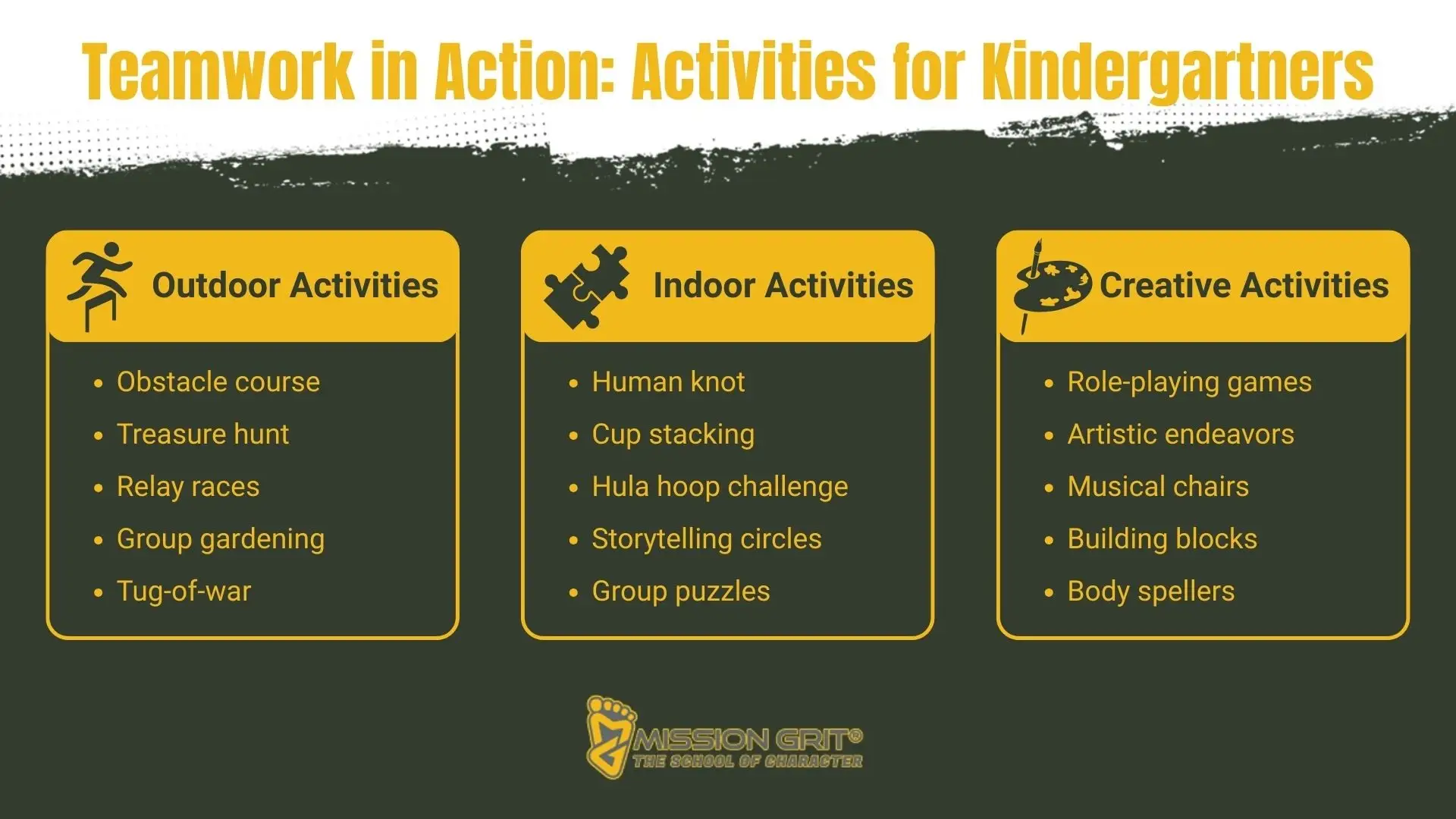
The fun can happen outside, too! Outdoor team-building activities provide the perfect opportunity for kindergarten students to burn energy while building teamwork skills. These fun team-building activities work especially well when the whole class participates together.
1. Treasure Hunt
A treasure hunt is a fun and exciting activity that requires kindergartners to work together as a team to solve clues and find hidden treasures. During the treasure hunt, the kindergartners will have the opportunity to explore their surroundings and use their observation skills. As they work together towards a common goal, they will experience a sense of accomplishment, satisfaction, and improved self-esteem when they finally discover the hidden treasure.
2. Relay Races
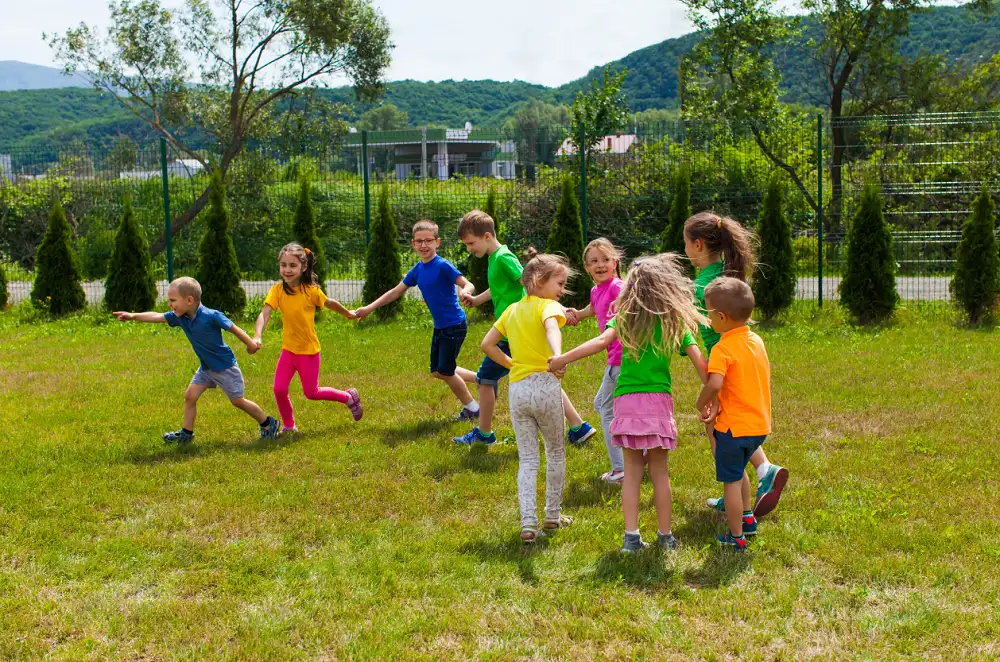
Relay races are a great way to get kindergartners active and engaged while also promoting teamwork and team spirit. Divide the children into teams and set up a relay race course, with each team member completing a different task before passing the baton to the next person. During the relay races, the kindergartners will have the opportunity to showcase their physical abilities, compete in a friendly and supportive environment, and rely on their teammates.
3. Group Gardening
Group gardening is an enriching outdoor activity that not only teaches kindergartners about plants and nature but also fosters responsibility and cooperation. Allocate a garden plot or pots for each team and let the children work together to plant, water, and take care of their plants.
Children will learn how to work together to create a thriving garden, taking turns to water the plants, pull out weeds, and ensure proper care. Through this activity, the children will develop a sense of teamwork and pride in their garden, as they witness the growth and blooming of the plants they have nurtured.
4. Tug-of-War
Tug-of-war is a classic team-building game that teaches kindergarten students the power of working together in the same direction. In this game, two teams grab opposite ends of a long rope and pull! This team-building activity shows kids how individual effort combined with teamwork can achieve amazing results. Plus, it’s always more fun when everyone gets excited and cheers for their team.
5. Obstacle Course
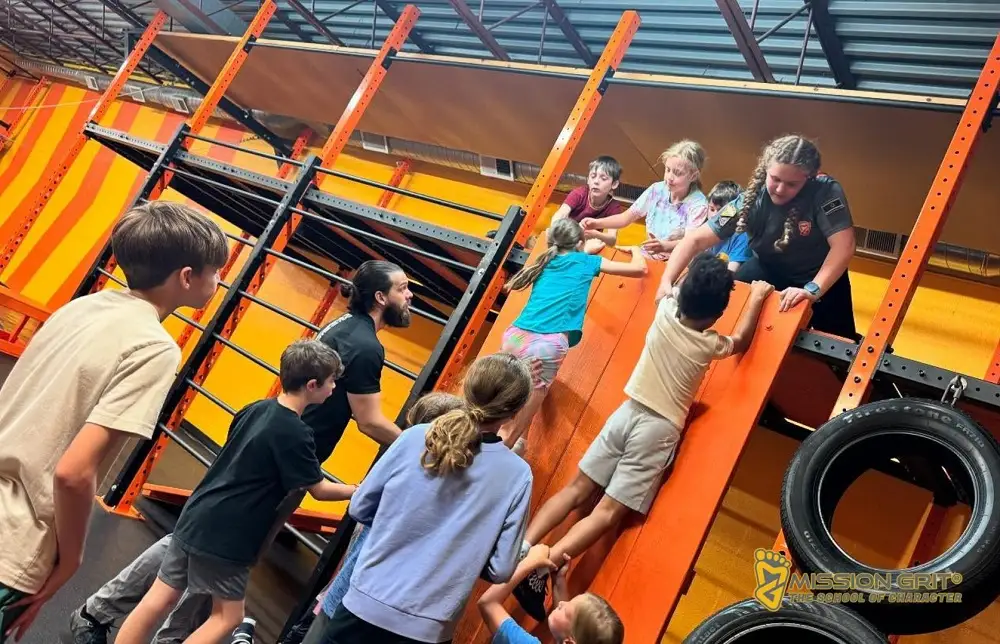
An obstacle course perfectly combines physical activity with team-building exercises. It’s ideal for kindergarten students who need movement and cooperation. Obstacle courses are ideal for the indoors and outdoors, adapting to available space and weather conditions.
Team-building activities like obstacle courses help children build gross motor skills, practice verbal communication, strengthen creative problem-solving, and boost confidence. An obstacle course can be created as a DIY obstacle course outdoors and indoors, or you can visit special venues that provide professionally designed courses for an even more engaging experience.
Indoor Team Building Activities
Don’t stress if the weather keeps kids inside; there’s still room for connection and growth. These indoor team-building games offer structure, creativity, and a chance for students to work closely in smaller teams.
6. Human Knot
The Human Knot is an engaging and interactive team-building exercise that gets kids thinking and moving together. Students stand in a circle and grab hands with two classmates across from them, forming a tangled “knot”. The challenge? Untangle the group without letting go of anyone’s hands. This great team-building game encourages communication skills, creative thinking, and teamwork as students strategize, listen to one another, and problem-solve their way to success.
7. Cup Stacking
Cup stacking challenges small teams to build creative structures using only plastic cups within a time limit. Students work together to plan their approach, with one student as the architect while others execute the plan. Although it sounds simple, this activity develops fine motor skills, encourages creative thinking, and teaches the importance of following verbal instructions while working as a team toward a common goal.
8. Hula-Hoop Challenge
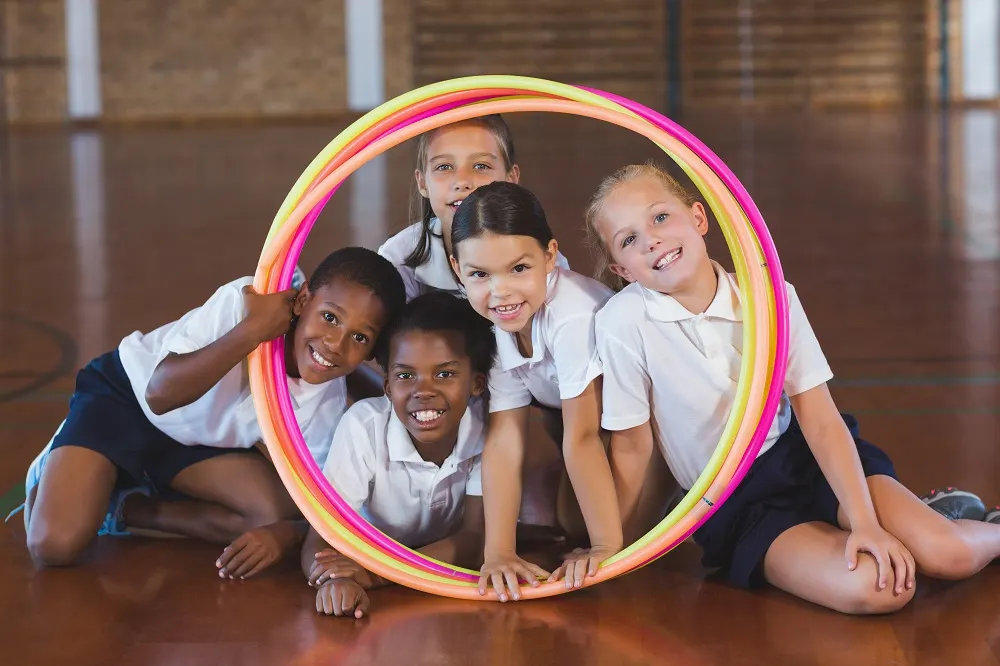
The hula-hoop pass is a fun, energizing team-building game where students stand in a circle holding hands and work together to move a hula-hoop around without letting go. This creative activity builds coordination, communication skills, and teamwork as each child helps their neighbors. It’s a playful reminder that every group member matters in reaching a shared goal.
9. Storytelling Circles
Storytelling circles are a great way to enhance kindergartners’ communication skills and encourage active listening. Gather the children in a circle and begin a story, allowing each child to add a sentence or two to the story. As each child adds their sentence, the story takes unexpected twists and turns, filled with colorful characters and imaginative settings. The children listen intently, eagerly awaiting their turn to continue the tale.
10. Group Puzzles
Provide children with age-appropriate puzzles and divide them into small groups. Encourage the children to work together to solve the puzzles, discuss strategies, and support one another. This activity helps children develop critical thinking skills, spatial awareness, and the ability to collaborate effectively.
Group puzzles are an excellent exercise for promoting problem-solving abilities and teamwork.
As children work together, they learn the value of teamwork, problem-solving, and perseverance. Through this activity, they develop essential skills that will benefit them not only in the classroom but also in their future endeavors.
Creative Team Building Activities for Kindergartners
Engaging kindergartners in creative team building activities not only fosters their imaginative abilities but also enhances their teamwork and problem-solving skills. Here are some creative activities that can be incorporated into the kindergarten curriculum:
11. Role-Playing Games
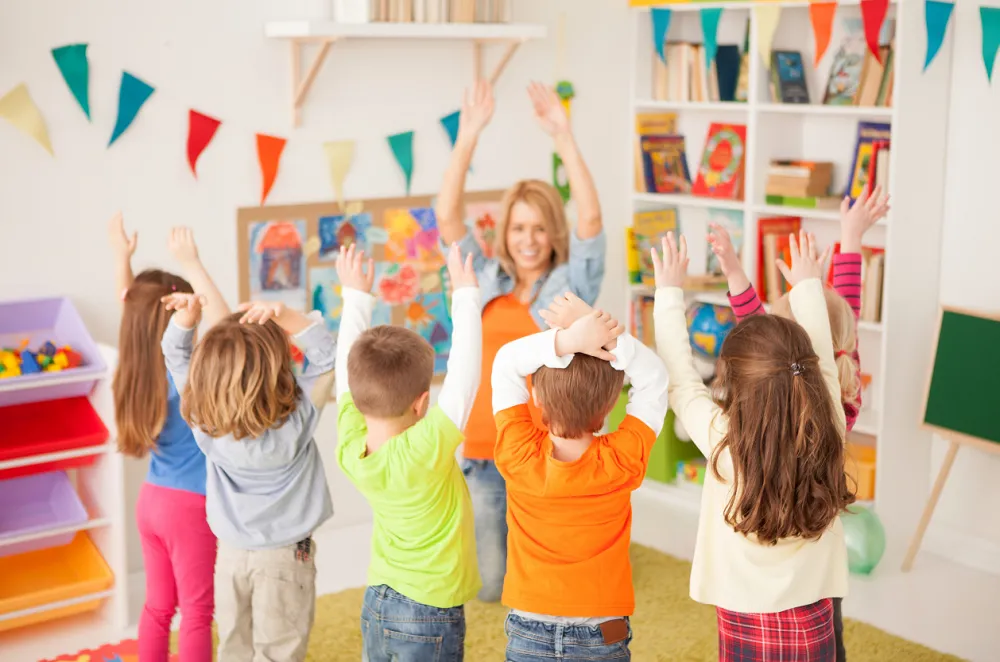
Role-playing games provide kindergartners with an opportunity to step into different roles and perspectives, promoting empathy and understanding. Assign different roles or scenarios to the children and have them act out specific situations. As children interact with one another, they learn to empathize with different perspectives and understand the importance of effective communication.
12. Artistic Endeavors
Group art projects not only allow kindergartners to express their creativity but also require them to collaborate and work together. Assigning a large-scale art project, such as a mural or a collage, encourages children to brainstorm ideas, coordinate their efforts, and support one another in realizing their artistic vision. They can experiment with colors, textures, and shapes, allowing their imagination to run wild.
13. Musical Chairs
Musical chairs is a classic game, especially popular as an exciting birthday party activity, that can be adapted to teach kindergartners important lessons about sharing and cooperation. Players walk around chairs while music plays, and when it stops, everyone finds a seat to share. By playing this game as a team, children learn to take turns, share limited resources, support one another, and foster good sportsmanship.
14. Building Blocks
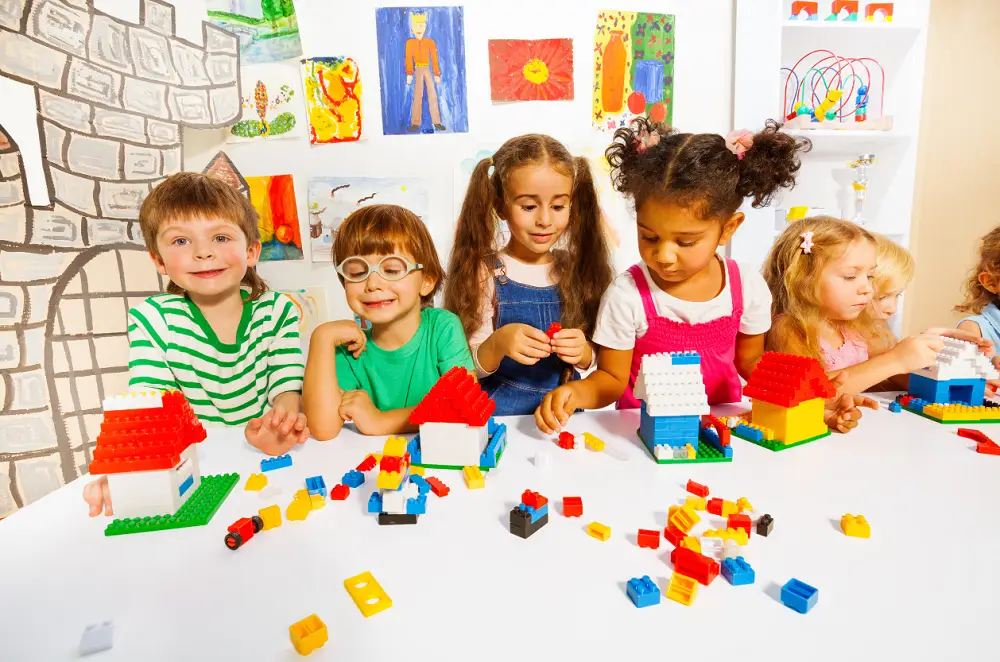
Provide children with a variety of building materials and ask them to work together in creating a structure. During the building block activity, kindergartners learn to communicate their ideas clearly and listen actively to their peers’ suggestions. They develop a shared vision for their structure and allocate tasks based on individual strengths and interests. By working together, they realize that their collective efforts yield better results than working alone.
15. Body Spellers
Body Spellers is an energetic team-building game where students use their bodies to form letters and words. In small teams, kids receive a word card and work together to shape each letter, with teammates guiding and supporting one another. It’s a creative activity blending movement and learning, building communication skills, teamwork, and early spelling abilities in a fun and active way.
Practical Implementation and Growth Monitoring
While all of these team-building activities are great starting points, the success of each depends largely on how well they’re structured and presented. Ideally, each team-building activity encourages children’s natural desire to play and learn together.
Successful Implementation Strategies
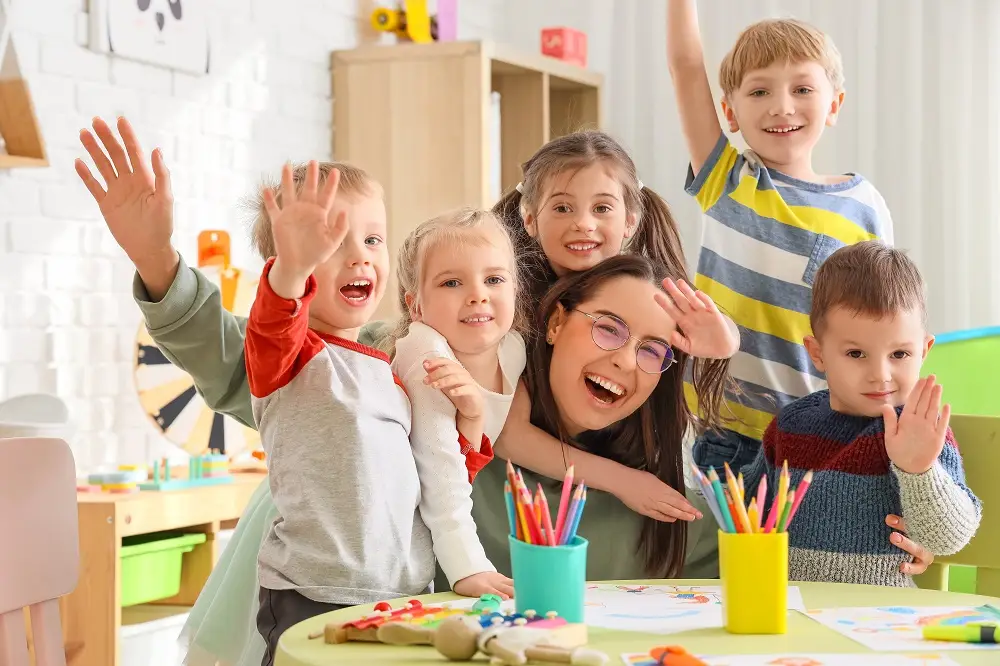
It’s not just about choosing activities — it’s about ensuring they’re delivered effectively and inclusively to attract kids. Here’s how to set your team-building games up for success:
- Age-appropriate design: Pick activities that match kindergartners’ abilities and attention spans to keep them challenged but not overwhelmed.
- Clear instructions: Give simple, clear steps with visual demos to help kids quickly understand what to do.
- Inclusive participation: Ensure every child can join, using their unique strengths to support the team.
- Safety first: Use safe materials and create a space where all kids feel comfortable and secure.
Remember, when activities are well-planned and thoughtfully implemented, they become powerful tools for social and emotional development!
Evaluating the Effectiveness of Team Building Activities
While engaging in team building activities is beneficial for kindergartners, it is essential to evaluate their effectiveness and make necessary adjustments for continued growth and development. Here are some ways to assess the impact of team-building activities:
- Observing behavioral changes: Monitor how children apply the skills learned in team-building activities to other areas of their academic and personal lives. Do they actively listen to each other’s ideas? Are they able to compromise and find common ground?
- Gathering feedback: Seek feedback from teachers and parents to assess the impacts. Conduct surveys, interviews, or group discussions to gather insights on the changes observed in children’s behavior, social skills, and academic performance.
- Adjusting activities for continued growth: Make adjustments to team building activities to ensure continued growth and development. If observations reveal that a particular team building activity is too challenging for some students, consider providing additional support or simplifying the task.
This ongoing assessment allows educators to refine their approach and maximize the benefits for all participants.
Fun, Growth, and Teamwork — All in One Place
Fun team building activities play a vital role in the social and emotional development of kindergartners. By engaging in activities that promote cooperation, communication, problem-solving, and empathy, young children develop essential skills that will benefit them throughout their lives.
At Mission Grit in Charlotte, we understand the power of team building in child development. We offer specialized team-building activities for kids, as well as exciting birthday parties, summer camps, and obstacle course programs designed to build character and cooperation. We focus on developing all aspects of a child, and 100 percent of parents see improved confidence in their child. Contact us today to learn how we can help your kindergartners develop these crucial life skills in a fun, supportive environment.

